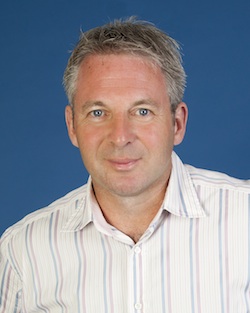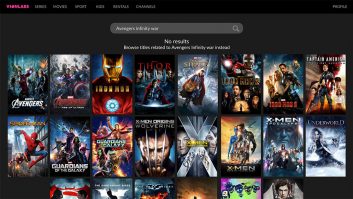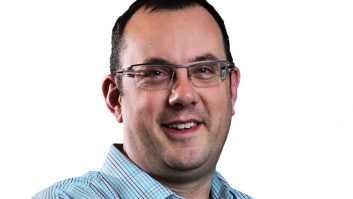
Whether it’s a freelancer looking to invest in new camera kit or an editing system, or a broadcaster seeking money for a studio upgrade, funding the deal will often involve a finance company that specialises in the media industry. Such organisations often have access to funding that is not generally available to individuals or businesses.
“What sets us apart from traditional high street banks and less specialist sources of finance is that we are able to lend against the value of the asset itself, such as a camera or the hardware in a studio upgrade,” explains Peter Savage (pictured), managing director of UK-based Azule Finance. “Regardless of the amounts of Quantitative Easing that is pumped into the economy, high street banks are still subject to regulation which means a certain proportion of lending has to be secured. What this means for small businesses or individuals looking to fund a camera around £30k (€34.7K) is that they must borrow against the value of property or tie it up with ‘book debt’, which can be very risky.”
Although Azule Finance is headquartered in England and has offices in Ireland and Germany, the company also provides finance options to companies in Spain, Portugal and Italy. Indeed, it would appear that UK companies are often the main source of financing throughout Europe.
“Alongside working in the UK, we operate on a brokerage basis in the Benelux territories and have found the appetite for funding broadcast assets there far more challenging than at home,” says Gareth Wilding (pictured), Sales & Marketing director of Fineline Media Finance.
In 1988 Fineline was bought by the equipment leasing division of NM Rothschild bank and became a principal funder, making its own decisions and lending its own money. “Because of the unique way Fineline is funded we have access to funds from Rothschild that are not otherwise available,” states Wilding.
Financing in practice
But how does the financing operation work? “The client selects the required equipment and chooses the supplier,” explains Paul Robson, managing director of Medialease. “An application to a finance company is then made for funding. Once approved, the finance company settles the supplier‘s invoice and then contracts with the client for the repayment in a suitable form.”
That sounds simple enough, but with the recent economic uncertainties has the finance market changed?
“Some of the larger broadcast companies may have had to alter how they approach their capital expenditure programmes because of the increasingly restricted access to liquidity or cash,” says Wilding. “In truth, it really should change a lot more. There should be a far greater reliance on managed-service offerings and operational leasing.”
Wilding expresses surprise that most buyers in the broadcast market continue to believe that today’s new equipment will still be as valid in three years time. “There are some notable exceptions which others really should examine. There are organisations that don’t own anything and their name isn’t even on the lease of the facility. The equipment and property are all handled by a managed service provider for a fixed monthly cost.”
Different scene today
However, the majority still decide to purchase equipment through financing deals – and here the funders have seen a change in the value of their contracts. Robson (pictured) explains, “Ten years ago, we were financing individual pieces of equipment at, typically, around £30K (€34.7K) to £500K (€580K). It might involve a simple Media100 video edit system, an Editbox and more often than not an SSL or AMS Neve mixing desk.”
Now, he reports, it’s more about financing complete systems and workflow solutions, rather than individual items of kit. “Advances in digital and solid state technology have meant major changes in the way broadcasters and production companies make programmes and get them on air. It’s a complete equipment technical solution that needs consideration not an individual item.”
Savage agrees that the changes have been inevitable. “The entire industry has changed massively and finance is no different. In the late Eighties and early Nineties it took upwards of £2 million (€2.3 million) to set up a post house — and even ENG cameras were selling for around £60K (€69.5K). Recent years have seen camera prices fall dramatically and it’s possible to buy a broadcast spec camera for around £10K (€11.5K).”
He says that the financial barriers to entry for new companies and freelancers are almost a thing of the past. At the same time, the proliferation of formats, for example, has meant that hire companies especially have benefited from holding a wide range of kit. “The average size of deals used to be about £75K (€87K) in early 2000s, but recently it’s come right down to around £30K (€34.7K).”
Financial future
With these changes, do the specialists see a healthy future for funding in the industry? “Our business is growing increasingly relevant in today’s challenging economic environment,” confirms Wilding. “Business owners are seeking more efficient and intelligent means of financing their growth and maintaining a competitive advantage. Specialists who understand the equipment being financed can add far greater value than a generalist financier who is simply examining the company’s balance sheet.”
Robson agrees, “The future for our business is very promising. Many leasing products still count as capital expenditure and we are seeing an increasing requirement from customers to supply them with leasing solutions that are considered operating expenditure. The criteria or qualification for this does vary slightly in different countries, but the overriding principles are the same.”
By Philip Stevens







